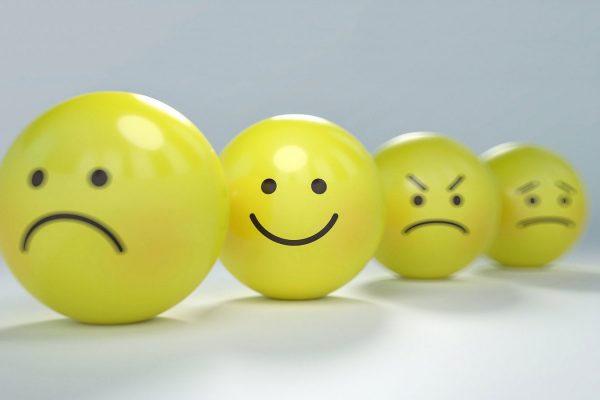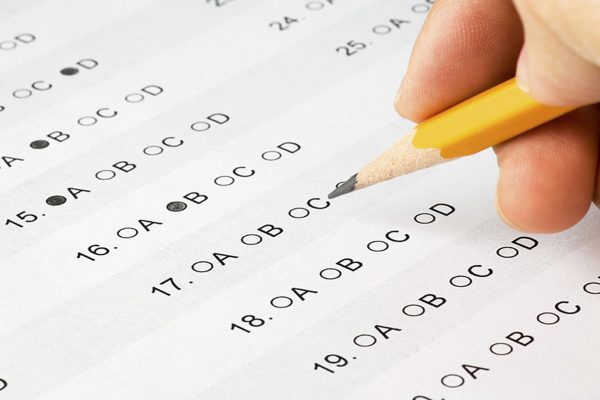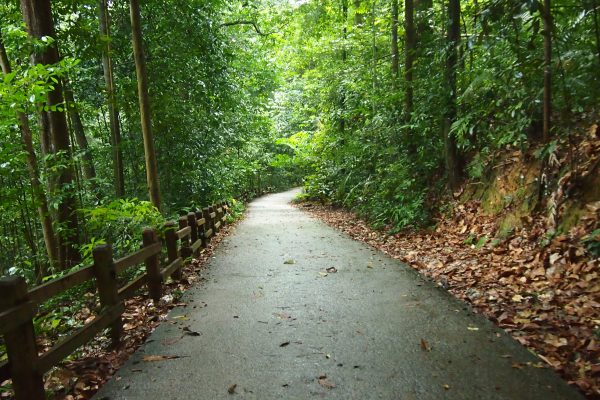
2022, Covid-19 and Changes
By Seraphina Chan
Since the start of COVID-19, there has been an increase in the number of schools and teaching staff seeking counselling support.
In a CNA article, “Workload for teachers ‘more than doubled’ during COVID-19 pandemic: Chan Chun Sing”, which shared about the plight of teachers amid the current situation, teachers were said to be spending “a lot of time” preparing lesson plans for both school-based and home-based learning to keep the school system going (Ang, 2021). They also have been required to take into account high-support students and perform additional duties, such as temperature checks.
‘If teachers are “not well taken care of” and “not in the best of conditions”, it is “very difficult” to expect them to take good care of the students’, said Mr Chan, Minister of Education, in the article.
As the saying goes — change is the only constant. As we enter the new year with the future still uncertain, building one’s resilience in coping with COVID-19 and the changes it brought about can support teachers in managing expectations and responding to situational demands. While it is not possible to control external changes, we can work on reducing our internal resistance to change through learning the skills of adaptability.
Adaptability
The American Psychological Association (APA) defines adaptability as “the capacity to make appropriate responses to changed or changing situations, and the ability to modify or adjust one’s behaviour when meeting different circumstances or people” (VandenBos, 2015, p. 18).
The University of NSW (UNSW) studied the benefits of adaptability, particularly for teachers’ well-being. It found that being adaptable can help teachers navigate unexpected situations and issues effectively, leading to better personal well-being and higher student achievements (Granziera, Collie, & Martin, 2018).
In the diagram below, which describes three zones of coping with COVID-19, adaptability falls within the learning and growth zones. This can be applied to other situations, such as facing a new class or having a new role at school.
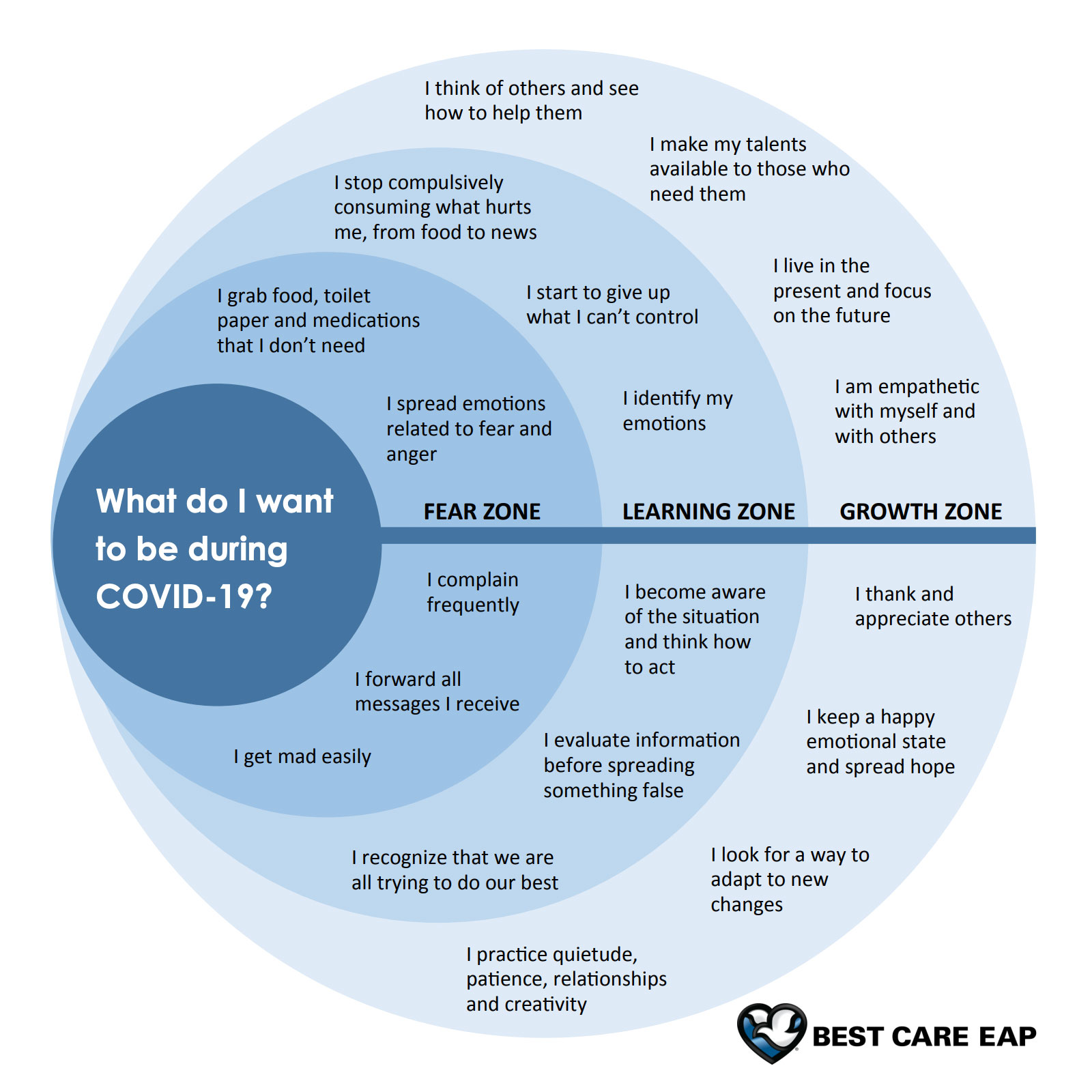
Source: https://bestcareeap.org/sites/eap/files/migrated_files/eap/uploads/PDF/COVID-CIRCLE-HELP-LINE-AD.pdf
Strategies to Cultivate Adaptability
Getting out of the Fear Zone
Consume news only from reliable sources (e.g. Singapore’s Ministry of Health and Ministry of Education or Straits Times) and verify them before sharing the news/information with others.
Individuals who scroll endlessly for a long period through social media and media outlets that are filled with negative news, for example, deaths and unemployment rates, have developed a habit known as “doomscrolling”, which can lead to burnout, anxiety, depression, FOMO (fear of missing out) and a decline in mental health (Watercutter, 2020). It is not worth adding to the stress that you are already feeling, so do avoid such practices. Instead, try talking to the people around you about topics that excite and bring you joy!
Moving into the Learning Zone
As recommended by Dr Aditi Nerurkar, a renowned public health expert and medical correspondent at Harvard Medical School, limit your news consumption to a certain amount of time per day or choose only two media platforms to get your news and updates from and stick to them. Try avoiding reading the news before bedtime too (Moore, 2020).
Acknowledge and accept your emotions instead of suppressing them when things are not going according to plan. Avoid judging yourself and allow your emotions (good or bad) to pass. Changes are inevitable, so learn to take one step at a time.
There are things you can control (feelings, what you do or say, etc.) and things you cannot control (mostly external factors, such as the weather, what others say, etc.). By knowing what they are, you can focus on the things that you can control and let go of those you cannot. Have faith that God has a master plan for you and the greatest challenge in your work or life may often be the greatest turning point of blessings (SHARE, 2021). You may say a short prayer to lift the day up to Him, regardless of what is going to happen.
Establish a routine in your classrooms especially if you are teaching a new class, such as having common goals and ground rules. This will allow your students to be aware of their boundaries and enable your classes to run more smoothly.
Remaining in the Growth Zone
Helping others can give us a sense of fulfillment. We can extend help to other teachers in need by listening to them, encouraging them, sharing useful community, church and school-based resources, checking in on them often to see how they are doing and more. We can also practise gratitude by thanking them specifically for what they have done well and reminding them of the difference they make every single day in their work with the students (Keely Swartzer, 2020).
Focus on the present and live fully in each moment by practising mindfulness, prayer and meditation or journaling. Engaging in self-care, such as practising compassion for yourself and doing the things you like, as well as keeping an open mind to be better prepared for changes can also help you remain in the Growth Zone. Educator and MSC Teacher, Lisa Baylis, MEd, provides The STOP and SLOW Practice below:
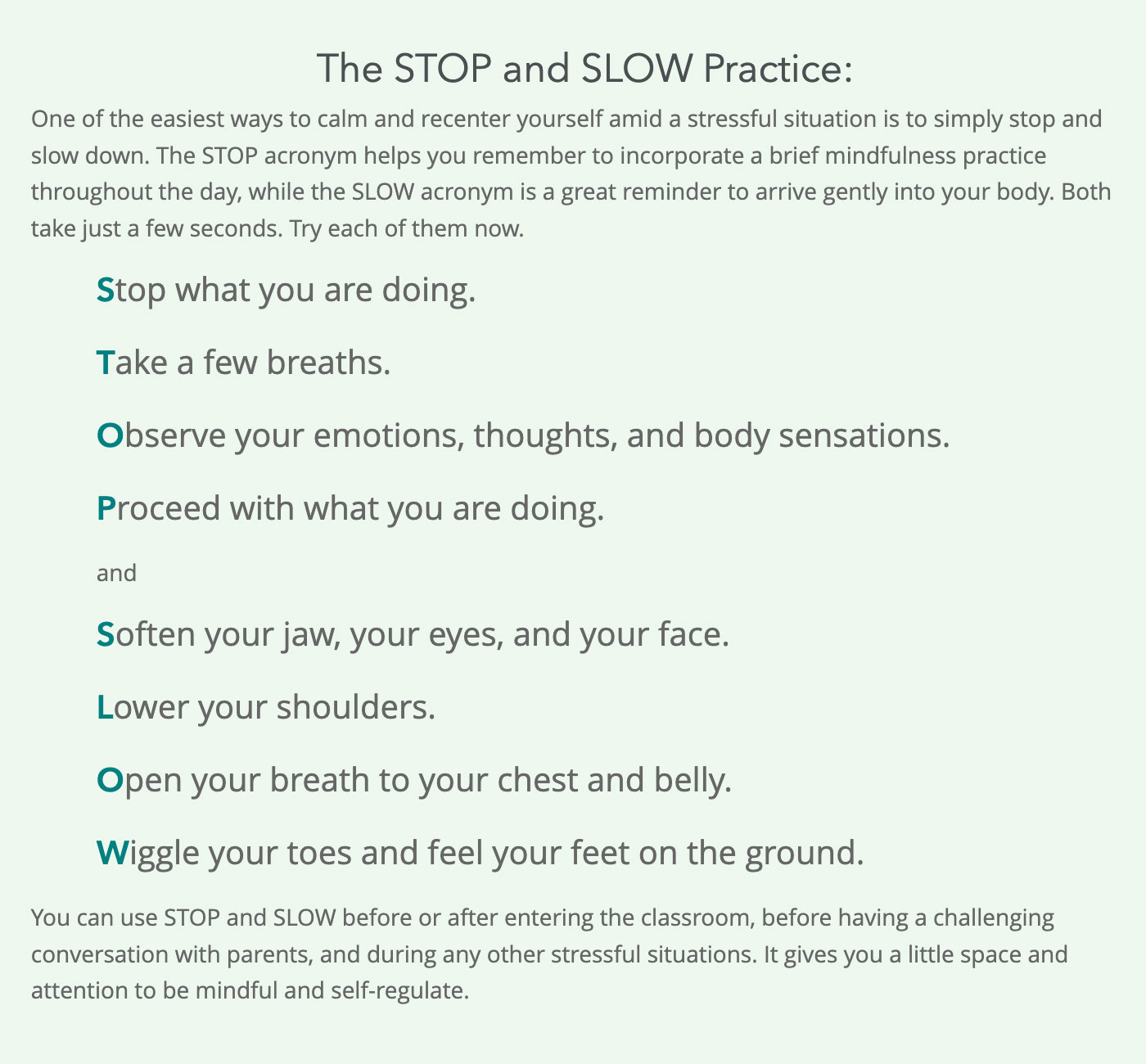 Source: centerformsc.org/self-care-compassion-for-educators-baylis
Source: centerformsc.org/self-care-compassion-for-educators-baylis
Additionally, to help you improve your adaptability in your teaching profession, you can consider methods, such as self-assessment, scenario-based learning, role plays or other professional development programmes (Granziera et al., 2019).
For students to be well, educators also need to be healthy, well and adaptable to mould and inspire their students. When we do this from a place of kindness and compassion, we will all grow to be healthier and happier human beings (Baylis, 2021).
References
Abby Moore (2020). How To Limit Your News Consumption While Staying Informed, From An Integrative MD. mindbodygreen. https://www.mindbodygreen.com/articles/limit-news-while-staying-informed
Allen, D.D., Cobb, J.B. & Danger, S. (2003). In-service teachers mentoring aspiring teachers. Mentoring and Tutoring: Partnership in Learning, 11(2), 177-182. doi:10.1080/13611260306854.
Courtney E. Ackerman, MA (2021). How to Live in the Present Moment: 35 Exercises and Tools (+Quotes). PositivePsychology.com. https://positivepsychology.com/present-moment/
Angela Watercutter (2020). Doomscrolling Is Slowly Eroding Your Mental Health. Wired. https://www.wired.com/story/stop-doomscrolling/
Ang Hwee Min (2021). Workload for teachers ‘more than doubled’ during COVID-19 pandemic: Chan Chun Sing. CNA Singapore. https://www.channelnewsasia.com/singapore/teachers-workload-more-doubled-covid-19-pandemic-chan-chun-sing-2285021
Best Care EAP. What do I want to be during COVID-19? https://bestcareeap.org/sites/eap/files/migrated_files/eap/uploads/PDF/COVID-CIRCLE-HELP-LINE-AD.pdf
Clarity Singapore Limited (2021). Thriving in the Pandemic: Adaptability Workshop.
Helena Granziera, Rebecca J. Collie & Andrew J. Martin, (2018). Being able to adapt in the classroom improves teachers’ well-being. The Conversation. https://theconversation.com/being-able-to-adapt-in-the-classroom-improves-teachers-well-being-95788
Helena Granziera, Rebecca J. Collie & Andrew J. Martin, (2019). Adaptability: An important capacity to cultivate among pre-service teachers. Psychology Teaching Review Vol. 25 No. 1, 2019. https://files.eric.ed.gov/fulltext/EJ1216443.pdf
https://www.researchgate.net/publication/299592012_Adaptability_An_Important_Capacity_for_Effective_Teachers
Keely Swartner (2020). 5 Ways Educators Can Support Each Other. Learners Edge. https://www.learnersedge.com/blog/5-ways-educators-can-support-each-other
Lisa Baylis (2021). STOP and SLOW: Self-Care and Compassion Practice for Educators. Center for Mindful Self-Compassion. https://centerformsc.org/self-care-compassion-for-educators-baylis/
TeacherVision Staff. Classroom Routines and Schedules. TeacherVision. https://www.teachervision.com/curriculum-planning/routines-schedules
The SHARE Team (2021). Teacher Rejuvenation: The Art of Letting Go of What’s Beyond Your Control. Resilient Educator. https://resilienteducator.com/rejuvenation-challenge/art-of-letting-go/
VandenBos, G.R. (2015). American Psychological Association (APA) Dictionary of Psychology (2nd ed.). Washington DC: American Psychological Association.
About the Author:
Seraphina Chan
Founder of GOVE | Lecturer | Teacher | Tutor | Coach | Trainer | BRAVE Volunteer
Seraphina Chan is a BRAVE volunteer at Clarity Singapore Limited. She earned a Statement of Accomplishment from Nanyang Technological University (NIE) in Assessment for Learning and Facilitating Learning in the Digital Age and successfully completed Essentials of Global Health from Yale and Psychological First Aid from John Hopkins University. She has previously written for the Church of Our Lady of Perpetual Succour and covered topics on spirituality, relationships and faith. She served in the Liturgy of the Word for Children and Communications Ministry.

